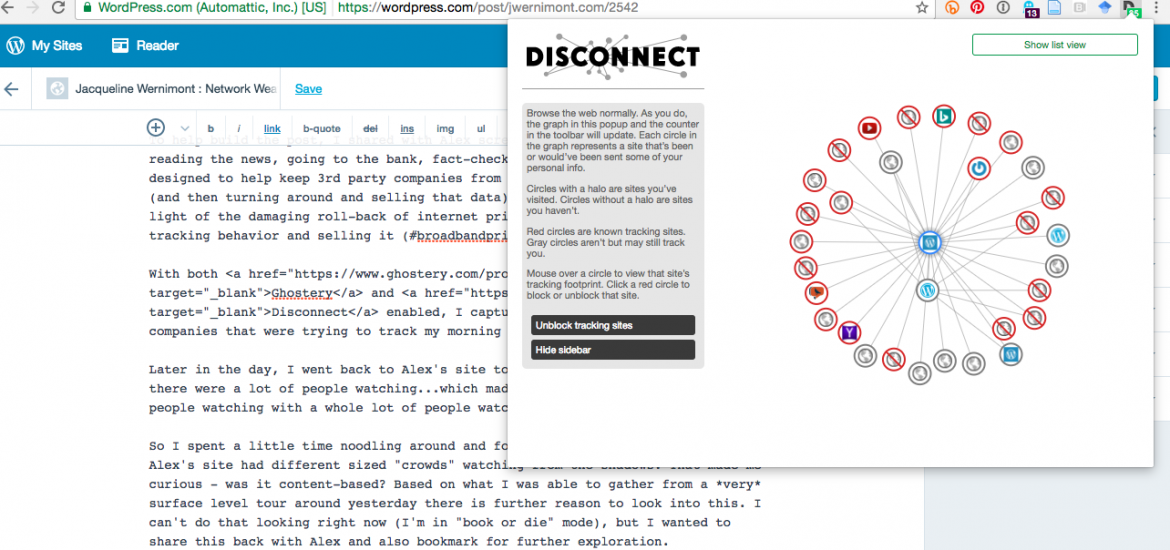Yesterday friend and fellow traveller in/on/around digital cultures Alexandra Juhasz posted #hardtruth #67 “Watch Those Monetizing Their Watching From the Shadows”, part of her series of 100 #hardtruths about fake news, digital culture, and the many challenges of the first 100 days of #45. To help build the post, I shared with Alex screenshots of my morning browsing – reading the news, going to the bank, fact-checking — with two […]
public writing
Remediation, Activation, and Entanglement in Performative (Digital) Archives – MLA2017
Let’s begin with a definition of terms: Barad’s ideas regarding entanglement and what they mean for how we approach history and memory has been really important to my work on digital editions, archives, and collections In this piece (which was a presentation) I’m going to do something a little bit strange and perform a fairly critical reading of a digital book project that I directed and helped to create: Performing Archives: […]
Forthcoming: Poetico-Mathematical Women
I’ve written a chapter for a forthcoming collection on history of early modern science and I was just asked to write up the abstract for said piece. In writing, I found myself pretty jazzed about the piece and thought I’d share at least the abstract with you all. I’m particularly tickled by the way the chapter harmonizes with work I’m doing right now on my book, which is all about […]
Addressing Anti-Feminist Violence Online – beginnings
I’m delighted to announce here that the Digital Media and Learning Competition 5: The Trust Challenge has selected FemTechNet’s “Addressing Anti-Feminist Violence Online” for funding. This was a wonderfully collaborative effort that arose out conversations sparked by both GamerGate and the violences experienced in the summer of 2014 by female public intellectuals like Dr. Sarah Kendzior (which Eric Garland’s Urgent Dispatch from the Seat of White Privilege does a good […]
Working Bibliography: Anti-feminist violence online and transformative justice resources
I’m sharing here the helpful resource collection work of the FemTechNet network. Errors are my responsibility and I’m happy to add reader contributions. Update 10/4: Fembot Collective and ICA respond to gamergate Anti-Feminist Violence Online+ Association for Progressive Communications Women’s Rights Programme, “End Violence: Internet intermediaries and violence against women online” Balsamo, Anne Marie. Designing Culture: The Technological Imagination at Work. Durham [NC]: Duke University Press, 2011. Blanchette, Jean-Francois, and […]
Gendered Risk: Feminist Programming
I recently heard Audrey Bilger of Claremont McKenna’s Center for Writing and Public Discourse talk about the ways that social media can help bring certain feminist issues to the fore – in her example, the exclusions of women of color from mainstream feminist movements by way of the #solidarityisforwhitewomen hashtag. While a lot went wrong in the mainstream coverage of that story, including the elision of Mikki Kendall’s role in initiating […]
Wikipedia Interventions for Feminist Dialogues on Technology
Academics nationally and internationally are beginning to integrate work on Wikipedia into their courses; it is a great way to get students to think about public writing, the creation of knowledge, citation, and to hone a few digital authoring skills. Many of the faculty teaching “Feminist Dialogues on Technology” – the FemTechNet Distributed Online Collaborative Course (DOCC) that is running this year – are going to include Wikipedia assignments. Adrianne Wadewitz and I […]
Be Bold! Create a Wikipedia Page and Skip the Review
I’ve had the pleasure of talking with new editors (I, myself, am relatively new) about Wikipedia editing, both at our WikiStorm event at THATCamp Feminisms this spring and via social media. In my academic circles, which includes a number of medieval and early modern scholars, it’s become pretty popular to edit pages. We have a lot of knowledge to contribute and I’m delighted to see so many people adding to […]
The audacity of work
I have a new sense of appreciation for Tanya Clement’s excellent “I am a woman and I am a mother and I do DH” post from Day of DH 2012. Right now, her sense of the “audacity” of being a mother in academia feels very real – particularly a sense of danger that is written into the word. When people ask how the holiday break was, I cringe. I generally […]
